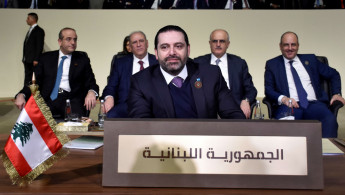Lebanon insists it can honour debts despite Moody's downgrade
Lebanon's financial and monetary situation is stable, Finance Minister Ali Hassan Khalil insisted on Tuesday, a day after Moody's downgraded the country's credit rating citing debt risks.
The Lebanese finance minister said his country was "capable of honouring all its engagements, namely its debts” despite an announcement by Moody's Investors Service that said it had downgraded Lebanon's issuer ratings to Caa1 - which corresponds to "poor quality and high credit risk".
The agency said the decision "reflects the heightened risk that the government's response to increased liquidity and financial stability risks will include a debt rescheduling or other liability management exercise that may constitute a default under Moody's definition".
Khalil downplayed the importance of the downgrade on Twitter, saying "the financial and monetary situation (in Lebanon) remains stable and the Treasury's (liquidity) needs are guaranteed".
Moody's said public debt in Lebanon was estimated at 141 percent of gross domestic product in 2018, making it one of the world's most indebted countries.
The global ratings agency recalled that in December 2018 it had already "changed the outlook on Lebanon's then B3 issuer ratings to negative reflecting rising liquidity and financial stability risks".
It noted that "the ongoing delay in the formation of a government is adding to Lebanon's pressures".
Prime Minister Saad Hariri was tasked with forming a new government in May after the country's first parliamentary elections in nine years.
But for the past eight months he has struggled to get politicians from all sides in the multi-confessional country to agree on a cabinet.
The finance minister admitted on Twitter, however, that the Moody's downgrade "confirms the need to step up the formation of the government in order to launch a financial reform process aimed at reducing debt".
Moody's ratings announcement on Monday came as the energy-rich Gulf state of Qatar said it would buy $500 million in Lebanese government bonds in order to strengthen the country's economy.
That came a day after Qatar's ruler Sheikh Tamim bin Hamad al-Thani made a surprise brief trip to Lebanon where he met President Michel Aoun and took part in the summit of the Arab Economic and Social Development Summit (AESD).
The AESD was formed in 2009 as an exclusively economic and development conference that tends to involve the private sector, including banks, chambers of commerce, industry and agriculture.
Middle East analysts say Qatar's move mark a bid to regain some of its soft power in the region dented by the counter-revolutionary frustration of the Arab Spring that Doha supported, and a Saudi-led blockade of the small emirate since June 2017.
Follow us on Twitter: @The_NewArab





 Follow the Middle East's top stories in English at The New Arab on Google News
Follow the Middle East's top stories in English at The New Arab on Google News
![The UAE is widely suspected of arming the RSF militia [Getty]](/sites/default/files/styles/image_330x185/public/2024-11/GettyImages-472529908.jpg?h=69f2b9d0&itok=Yauw3YTG)
![Netanyahu furiously denounced the ICC [Getty]](/sites/default/files/styles/image_330x185/public/2024-11/GettyImages-2169352575.jpg?h=199d8c1f&itok=-vRiruf5)
![Both Hamas and the Palestinian Authority welcomed the ICC arrest warrants [Getty]](/sites/default/files/styles/image_330x185/public/2024-11/GettyImages-2178351173.jpg?h=199d8c1f&itok=TV858iVg)